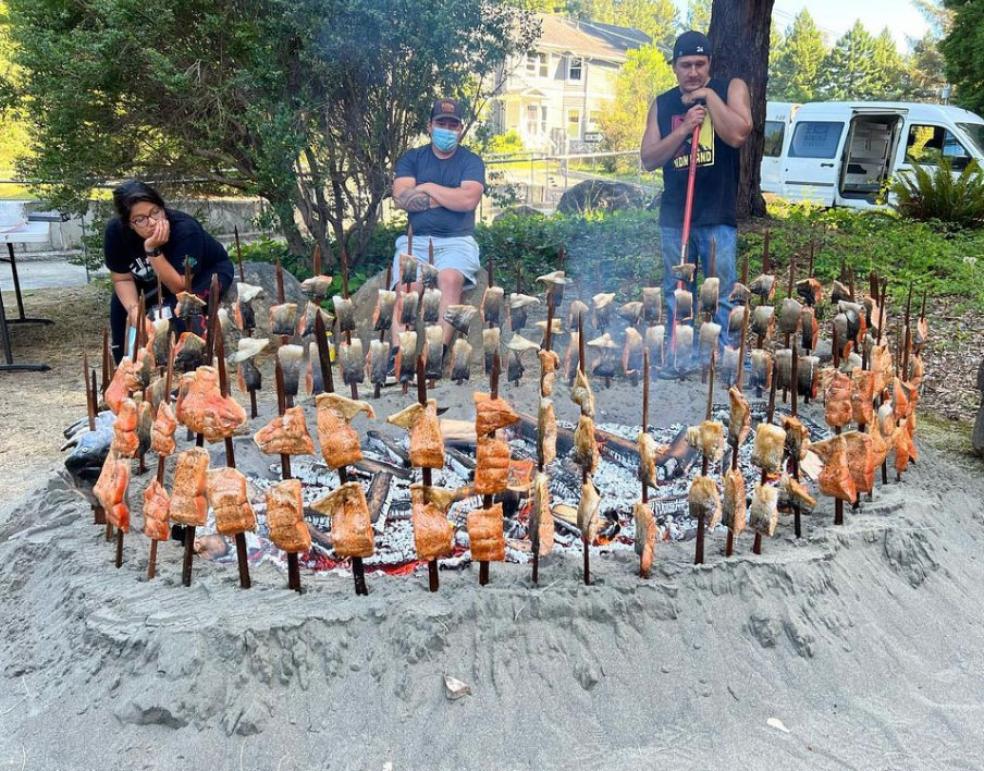
The program is an intervention derived from community-informed, culturally based strategies and will implement health and wellness curriculum through youth camps (online and in-person), high school course modules, and youth-led research and evaluation practices. Professors Cutcha Risling Baldy and Kaitlin Reed are the Co-Principle Investigators for the program.
The project will assess how “Food for Indigenous Futures” can increase mental health and wellness while also serving as a drug, alcohol, and substance abuse intervention by bringing youth back into good relations with the land, their traditions, and community. The long-term objective of this study is to develop tribally informed, place-based, and culturally informed programming for mental health and substance abuse interventions amongst Native American youth and to provide publicly available curricula and digital resources.
“The Food for Indigenous Futures Program demonstrates the transformative power of Indigenous food sovereignty for youth in our community and the impact of centering Indigenous knowledges, perspectives and experiences in place-based learning, says Kaitlin Reed, Co-Director of the Lab and Assistant Professor in the Native American Studies Department. “I am so incredibly proud of the contributions of the Rou Dalagurr Food Sovereignty Lab to both our campus and broader community.”
In addition to building programs that increase strength and resilience, reduce health disparities, and build health and wellness through place-based programming for Indigenous youth, this grant will support the creation of an Indigenous youth council that will serve in an advisory capacity to the Food Sovereignty Lab, and enable the Lab to host the annual Indigenous Foods Festival through 2025.
Project director and new Food Sovereignty Lab Coordinator Marlene’ Dusek says, “we have always lived in a world that centers the next generation as we know they will be the ones who lead us and continue forward. Youth will lead us in futures that our ancestors have always known, that our cultures have always known, that our places have always felt, on land that has always been taken care of and prayed upon.
“The Food for Indigenous Futures grant just carries forward those teachings and honors our ways to care for our children and communities by centering our collective mental health and connection to our traditional foods, and our responsibility as land caretakers, as providers for our families, as language carriers, and as traditional ecological knowledge practitioners. This work continues to support and center our youth and communities and is working in the continued fight for food justice and collective healing for Indigenous communities.”
Dusek is an ethnobotanist and Indigenous scientist with extensive experience working with Indigenous youth. She has coordinated and implemented dozens of youth workshops. As project coordinator she will manage project activities alongside the youth council and steering committee.
The Rou Dalagurr Food Sovereignty Lab and Traditional Ecological Knowledges Institute is
dedicated to the learning, research, hands-on practice and preservation of food sovereignty, and Traditional Ecological Knowledges.
“Our lab continues to grow and we are excited to bring youth into our lab projects and research programs. We appreciate the ongoing support of the community and are proud of the work students have done to fundraise, write grants, and envision new projects,” says Lab Co-Director and Department Chair of the Native American Studies Department Dr. Cutcha Risling Baldy.
The purpose of the Lab is to provide an opportunity to work directly with the surrounding communities, tribal nations, and national and international scholars and community leaders to center, learn, and engage with Indigenous science, environmental management, and preservation practices. The Lab is dedicated to building national and international connections that foreground Indigenous voices in rigorous academic research, publications and community-centered programming, connecting youth to higher education, policy development, economic development, and climate resiliency.
The Food Sovereignty Lab will officially open in Spring 2023. To donate to the Lab, visit the Humboldt Giving website. You can also learn more by signing up for the Lab’s newsletter.